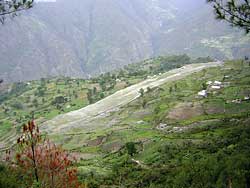As the helicopter from Nepalganj unloaded sacks of rice at Mugu's Talch airfield earlier this month, a ragged bunch of porters rushed forward even before the rotors had stopped. They earn money transporting the sacks to the district headquarters in Gamgadhi, a two-hour walk away.
One of the porters wasn't interested in the sacks. He came over to us and offered to carry our camera equipment. Dhan Singh Biswokarma used to be a blacksmith in Dhum village and had a prosperous business crafting gold ornaments. But with the insurgency, anyone with any gold in these remote mountains of western Nepal either sold it or took it down to Nepalganj and Lucknow.
So, Dan Singh travelled to India, where he portered at pilgrimage sites to earn money. He then got stuck in Nepal when the Maoists started preventing villagers from going across the border, so he now works as an airport porter in Talch to support his wife and four children. "Luckily, my elder daughter eloped, that is good. She is happy, and I am relieved of a great burden. I hope my younger daughter follows her example," he says.
He sees that we notice his unkempt look and dirty clothes. "Don't worry, sa'b," he tells us, "my clothes are dirty because if I wash them they'll fall apart. They are the only clothes I have." Since he is such a good talker, we hire Dan Singh more as a guide than a porter.
He takes us to Rara. There are no tourists, but there is a lodge near the army camp guarding the national park. It is incongruous to see guns bristling amidst the breathtaking beauty of the simmering lake perched over the Mugu Karnali valley with the great mountains beyond.
The rice porters have lumbered off to Gamgadhi, each carrying a 40kg sack. The rice is supposedly for the local people of this chronically hungry region, but in the district headquarters we hear stories of the rice finding its way to the local market where it is distilled into rakshi. The CDO knows about this, but can't do much. Last month, he sent 30 sacks of rice to a village running out of food, but the Maoists looted it along the way.
Gamgadhi has become a refugee camp for VDC secretaries. They live in rented rooms, calculating the budget allocations for villages they can't go to. With the fiscal year closing, there are a lot of fictitious projects that have suddenly been 'finished', and the DDC accountant is busy writing out cheques. Recently, however, the Maoists warned the secretaries to behave themselves, and apparently the reports have suddenly become much more accurate.
The ex-MP of the area, Chandra Bahadur Shahi, says Gamgadhi has become a government garrison. The Maoists destroyed the suspension bridges across the Karnali, and seven Mugu VDCs are now cut off.
In Gamgadhi itself a siege mentality prevails. The civil servants fear for their lives, the security forces have orders to protect themselves and their weapons first. Every morning, a procession of senior civil servants, police and soldiers walks down from the heavily guarded barrack where they spend the night. They stay in their offices from ten to five, while the soldiers and police laze around the bhattis drinking and talking boisterously. At five, they all troop off again to the army base to spend the night. In the bazar official curfew hours are from seven till five the next morning, but there isn't a single soldier to enforce it.
Mugu's only airfield at Talch took 25 years to complete and went into operation recently. Two months ago, the Maoists bombed its small tower building and the air traffic controller now sits at a desk with a portable radio set to guide in the once-a-week chartered flights from Nepalganj.
Dhan Singh's son is attending school, but the teachers are absent half the time. The schools are being forced by the Maoists to adopt their revolutionary calendar with a holiday on Mao Zedong's birthday. Seventy five percent of the schools in Mugu already follow it. "I have decided to pull my son out," Dhan Singh says. "I don't want him to go to school to learn to fight. I want him to learn to read and write."
We ask Dhan Singh whether the Maoists are good or bad. "I can't say. They are against discrimination and told us not to call ourselves kamis anymore, they stopped gambling and alcoholism and are encouraging cooperative farming," he says carefully, weighing each word, "but at the same time they are killing people, disturbing schools and extorting money from us. How can I say whether they are good or bad? I am just telling you what I have seen."

Dhan Singh Biswokarma resting along a forest path near Rara Lake.

The lake simmers in the late afternoon sun.

Porters at the Talch airfield rush to a helicopter bringing sacks of rice for Mugu.

Mugu's only airfield at Talch was completed recently.

The Maoists immediately destroyed the tower building .

Talch's air traffic controller sits at his desk waiting for a flight from Nepalganj.


